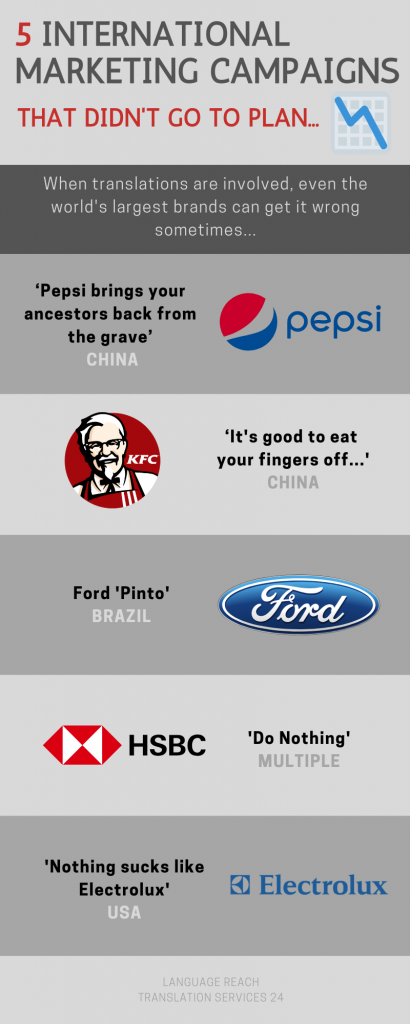A marketing campaign can often ‘make or break’ a product. In fact, it can sometimes ‘make or break’ an entire brand. PR and marketing experts habitually say that it doesn’t really matter how good or bad your product is, the only thing that truly matters is how you present it to the potential customer. Although rather snobbish, not without some truth to it.
In a competitive business world, success of a product is measured predominantly by how well the potential customers welcome it on the market. This benchmark becomes even more significant when a brand plans to expand internationally, as not only the product, but also the brand itself, is on the line.
In the past, majority of companies, regardless of their sector, preferred the ‘one-fits-all’ approach. Cheaper in execution, the method focuses on penetrating each of the chosen markets using an unaltered original campaign, based on the assumption that because the said campaign worked well in company’s home market, it will also automatically be successful abroad.
Today, in a globalised world, business owners and marketing agencies begin to fully understand and appreciate the direct impact culture, language and customs can have on how a marketing campaign is perceived by the audience. As a result, campaigns tailored individually for each of the chosen markets with the help of professional translation agencies are now the preferred method during a corporate internationalisation process.
Nonetheless, in order to fully realise the positive effects a tailored campaign has on the business, and on the contrary, the weaknesses of the ‘on-fits-all’ approach, companies and organisations unfortunately had to learn it the hard way.
Below, we’re taking a closer look at some failed international marketing campaigns, which were disastrous due to the lack of a tailored approach, localisation and transcreation.
- PEPSI
The lack of professional localisation and translation were the main causes behind a failed campaign by one of the world’s largest companies. While approaching the Chinese market, Pepsi used the slogan ‘Pepsi brings you back to life’, which makes perfect sense in English, when literally translated into Chinese however, the slogan becomes ‘Pepsi brings your ancestors back from the grave’.
In a culturally sensitive market such as China, any remarks regarding ancestors can be seen as inappropriate, and so a blunder in a marketing campaign can be quite harmful when it comes to brand image.
- KFC
KFC, similarly to PEPSI, tried to approach the Chinese market without doing their homework and as a result failed miserably. In 1980, the fast-food giant, opened their first outlet in Beijing. Their world-famous slogan ‘Finger lickin’ good’ was literally translated as…’It’s good to eat your fingers off’! Fortunately for the company however, this gaffe didn’t affect their business in the long run as today, KFC has over 4,000 restaurants in China.
- FORD
Brazil is a growing economy and a very appealing market for brands from majority of sectors. One of the companies which decided to expand their sales to Brazil and take a slice of the automobile market share, was Ford. The company introduced its newest car named ‘Pinto’, but quickly realised that the name is in fact the reason why the car’s sale numbers were very low.
‘Pinto’ in Brazilian Portuguese is a slang word for…well, for exactly what you think it might be. After investigating and realising their mistake, Ford decided to undergo a costly rebranding
- HSBC
HSBC is one of the world’s leading banks, but that didn’t stop them from a serious slip-up during their international marketing campaign in 2009. The bank’s popular ‘Assume Nothing’ slogan had to be replaced as in some international markets it was literally translated as ‘Do nothing’. This mistake turned out to be rather pricey, as the alteration to ‘The world’s private bank’, which is much better understood in different languages, costed the bank an estimated $10 million.
- ELECTROLUX
Although making branding and marketing blunders usually happen when English speaking brands expand overseas, Electrolux proved, that these can also occur when foreign companies approach culturally easy-to-understand, English-speaking markets. The Swedish giant got a quick lesson in English when it tried to introduce its new powerful vacuum cleaner to the U.S consumers. The slogan ‘Nothing sucks like Electrolux’ might be the reason behind the product’s failure.
The above mistakes clearly show, just how complex marketing translations can really be. In most cases, language is only one of the factors which need to be considered during internationalisation and international marketing campaigns. Culture, customs, history as well as socio-economic aspects simply must be taken into account when introducing new service or product to a foreign market.

